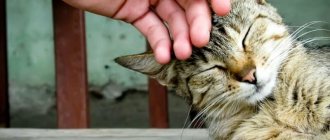Cats have an extremely developed hunting instinct. When a cat is always inside the walls of the house, she communicates little, she does not have many opportunities to satisfy the needs of her predatory nature. Bored or in a playful mood, the cat begins to stage comic attacks, often biting its owners on the legs. It should be noted that most owners do not respond to these attacks. This approach is wrong, because in this way an adult cat learns such behavior as the norm, thereby causing pain to its owner.
Reasons for cat attacks on owner
There are several reasons for the aggressive behavior of your four-legged friend. If the owner learns to distinguish them, then he can control the animal and control its behavior.
A cat attacking its owner is a negative manifestation of the animal’s character.
Here is a list of the most accurate signs of aggression and agitation in domestic cats towards their owners:
- defensive posture;
- ears point back, flattened;
- the fur on the withers rises to the top;
- the tail is curved inward;
- creeping gait;
- turn towards the enemy;
- open mouth, hissing and spitting.
If the owner discovers these signs in his pet, then he should be extremely careful with him, as there is a threat of attack from the animal.
Miseducation
Attacks on the owner by an already adult domestic cat are often associated with improper upbringing since childhood. A small kitten cannot be weaned from the habit of biting its owner's leg or hand. The absence of punishment is an incentive to continue such behavior.
Important! At an older age, such attacks on the owner by the cat become a habit, which ultimately develops into poor upbringing.
Poor upbringing of a cat is the reason for its aggression
Breed characteristics
The predator instinct is one of the manifestations of the natural characteristics of a cat. This behavior is typical for the game. However, the game is only for humans, while for a pet it is hunting.
Sometimes a cat's roar is associated with his desire to show himself as the master of the situation. Even if the pet is the only animal in the house, its hunting instinct manifests itself at the genetic level.
To reliably establish why a cat rushes at its owner and bites, it is necessary to examine the circumstances under which this process occurs. You need to understand exactly what actions this is associated with.
Important! The cat rushes at its owners, what to do, how to do the right thing? The first step is to move away from him to a certain unattainable distance.
It is worth highlighting separately some varieties and breeds of cats that are “mean by nature”:
- Siamese. This breed has an innate “master cult”, in which the cat is jealous of its only owner and attacks the rest of the household.
- "White" cats. Aggression is associated with the presence of “Angora” blood. Most of these cats are born deaf and therefore display excessive aggression.
- "Blue" cats. They have a natural distrust.
A cat's aggression may be based on breed characteristics.
Separation from mom
The state of a pet in which its needs are not met is called frustration. For example, early separation from mother or improper weaning of a cat from milk.
As a result of the latter, the cat cannot obtain its own food. The cat had to teach this instinct. Signs of this condition:
- the cat has become aggressive, attacks the owner, even if he trusts her;
- the pet growls if it has not received the proper reward;
- growls loudly and rushes at the door.
Other reasons
Other common reasons include fear. Due to decreased attention, the cat rushes at its owners. And if, as a kitten, an animal received insults and even beatings from a person, then fear will accompany the adult animal all its life.
Among the main factors are:
- the cat attacks the owners if some kind of irritant appears;
- aggression is accompanied by threatening poses;
- in addition to growling and posturing, the animal can swing its paws;
- after the situation has been resolved, the animal relieves stress by licking its fur.
Important! If a cat attacks a person, it is useless to scold, much less beat him. It is unlikely that such punishment will lead to correction. Most likely, on the contrary, the cat will always expect bad things from the person, which will worsen the situation.
Offense is a fairly common situation in which a cat attacks its owners. If a pet believes that it has been unfairly offended, it can take revenge and behave aggressively, even when the owner takes it in his arms to caress it. You should use a trick and try to appease your pet with treats.
Another significant reason is the situation when the cat does not like to be in large crowds of people, play with children or change hands. He may be dissatisfied with the situation and, as a result, attack those who bother him. To eliminate the factor, you should isolate the animal in a separate room or on the balcony, especially when it comes to children.
Aggressive behavior can also be caused by a cat's pregnancy. This is a natural condition in which the female may attack in order to protect her unborn kittens. It is enough to let her know that she can trust her owner. This behavior will disappear.
A painful condition can cause aggression; the animal can go berserk at any moment. In such a situation, the pet wants to be touched and disturbed as little as possible. To recognize the condition of the disease, it is enough to monitor your pet for just a while. If other signs are noticeable: poor appearance, apathy, poor sleep, refusal to eat, then you should visit a veterinarian for a diagnosis and timely treatment.
Cat aggression has a number of different causes.
What should an owner do in response to cat aggression?
If the owner is tired of constant attacks from the pet, then it is necessary to start raising him. The owner must do everything possible to prevent the cat from having the desire to rush at the child or strangers.
scold
You should not scold a cat when it tries to attack its owner. The cat's disposition is such that these animals can remember insults inflicted on them.
The best way is not to scold, but simply to ignore. This means not responding completely to the behavior, even with words. Only then will the cat understand the reason for such an attitude of the owner.
Re-educate
When retraining your pet, the following recommendations should be followed:
- do not play with the cat with your hands and feet;
- buy only those toys that allow you to play at a distance with the owner (fishing rods, candy wrappers on a string);
- If a cat grabs your hand, do not suddenly pull it out. In such a situation, she will become even more angry and will only intensify her aggression. You should freeze for a while, wait until the pet releases your hand, and then stop playing. In this way, the cat will understand that aggressive behavior is a reason to end the game and communicate with the owner;
- in order for the kitten to grow up calm, you should devote more time, love and affection to it;
- During the training process, you should be patient with the animal and not beat it. Education must be accompanied by patience on the part of the owner. The animal should be helped to recognize the bad behavior.
Important! A pet should be trained and raised from the first days of its arrival in the home. Only in this case will the process be effective.
You should raise your pet properly
Showing you care
Showing care, affection and love is an important rule in the fight against a cat’s desire to attack its owner. Among the manifestations of concern are:
- you should pet your pet;
- speak kind words to him more often;
- pet the animal;
- pamper with treats;
- play.
Other methods and recommendations
General recommendations on how to stop a cat from rushing at its owner include:
- Suitable toys should be provided for the cat that allow it to exercise its hunter instinct and pounce on its “prey”;
- a special board or pillow should be offered for scratching and “beating”;
- You should spray your cat with water every time he bites or does something unacceptable;
- if possible, take another animal so that it doesn’t get boring;
- in some cases, the cat is castrated, which sharply reduces its aggression;
- You should explain to your child how to play with your pet correctly so that it does not get angry or attack.
Measures aimed at changing the cat's behavioral strategy
First of all, when the animal begins to show even the slightest signs of aggression, do not try to distract it with treats or its favorite toys. Do everything to make him lose interest in you. For example, go into another room and close the door.
If the cat has already learned to manipulate you, try to re-educate him. You should not ignore the animal’s attacks, as this can only provoke a new round of its aggression. Punish your pet using one of the above methods, but do not try to console and caress him right away, otherwise he will immediately repeat his attempts to achieve what he wants.
Examples of the most aggressive breeds
Below are the most aggressive breeds.
Siamese
Many pet lovers prefer Siamese cats because they are very beautiful in appearance. However, not everyone knows that as pets, they are not the friendliest to others. Siamese cats and cats are known for the fact that they communicate mainly with only one owner in the house, and other family members are jealous of him.
Important! They can literally completely ignore everyone else in the house. They do not like children and are not very affectionate with anyone other than their beloved owner.
Without respect for other people, representatives of the breed easily fall into an aggressive state and can even cause serious wounds.
Siamese cats are one of the aggressive breeds
Savannah
The cat breed has a direct blood connection with the Serval and the Siamese cat. The animal is characterized by energy, mobility, jumping ability, and curiosity.
The habits of a predator are clearly expressed, hence the aggressive behavior towards the owner. Like Siamese cats, Savannah chooses one single owner and treats others with contempt.
Hunting instincts passed on from the serval sometimes require careful control by the owner and education from childhood.
Savannah - a mix of serval and Siamese cat
Abyssinian
Abyssinian cats have a very energetic temperament and natural curiosity. Until old age they remain active and restless. Some compare the animal's character to that of a dog. High mobility is often accompanied by attacks of aggression, especially during the game.
Important! From childhood, the breed lacks a sense of fear and self-preservation, so education is required from an early age.
The Abyssinian cat breed is restless from birth.
Cat attacks are no joke, and cat bites can be more susceptible to infection than dog bites. The reason for this is that the cat's sharp teeth create deep puncture wounds in the area that are sufficient for bacterial activity. What to do when a cat attacks its owners? Although most people find this display of cat character amusing, it is not a good idea to continue this game. It is necessary to make the animal understand that its behavior is not acceptable. For this purpose, cats are sprayed with water and their attempts to continue playing are ignored.
>The cat has become aggressive and attacks the owner. What to do?
Common reasons why a cat attacks its owner
It happens that a cat reacts negatively to a person, but the owner does not notice this. The pet may hiss at small children. If the child continues to touch the animal, the meeting will end in aggression and conflict.
If a cat attacks its owner, there is a reason for this. In most cases, aggression is caused by factors affecting the pet's mood. After this, the animal becomes conflicted. Common reasons:
- Breed characteristics. Some cats are more prone to aggression. This applies to the Angora, Siamese breed. The character of pets is characterized by excessive jealousy and a wary attitude towards strangers. The Siamese cat fiercely defends its territory and is difficult to train and train.
- Errors in learning. When people adopt a small kitten, they often start giving him hands to play with. It is considered cute, funny entertainment. However, as the animal grows, its teeth change, becoming sharp, and its paws gain strength and strength. As you age, the habit of playing with your hands and feet will become ingrained, and it will be difficult to get rid of it. Bites from an adult cat can leave painful wounds.
- Emotional stress. Often, owners do not notice that their pet has been under stress for a long time. Over time, the pet begins to react nervously to everything. For example, the cause of negativity may be touching a bed, bowls or toys. Animals experiencing stress develop a hostile reaction after touching certain parts of the body, such as the abdomen or armpit area.
- Early separation of a kitten from its mother. A wary, aggressive attitude is observed in foundlings weaned before the age of 2 months. Kittens without a mother have difficulty adapting to the external environment and begin to see a threat in a new owner or another animal. Over time, the kitten will get used to it and stop attacking without reason.
- Redirecting negativity. Everyone should remember that you cannot go and separate fighting cats. Animals can be distracted and work together to attack the intruder. After a fight, cats are in a cocked state, so it is also better not to touch them for a while.
The reasons listed above are common. A person can do everything not to face these problems. For example, you should not take kittens under 2-3 months of age. My wish to the new owners is not to teach their children to play with their arms and legs.
Other reasons for hostility
Some situations are quite rare. However, they provoke hostility with the same force. Therefore, it is advisable to know when your pet still shows aggression.
Reasons that provoke aggressive behavior:
- Problems at an early age. This applies to cats picked up on the street. The previous owner may have treated his pet poorly or beaten him, which affected his psyche. Therefore, at first, a stray cat from the street will treat its new owners with caution. Normal, comfortable conditions with care and attention will help the animal adapt faster.
- Hostility from a cat that has just given birth. For the mother, the safety of the kittens comes first. Therefore, after giving birth, females react aggressively to animals or people approaching their offspring. When the kittens mature, this behavior will end. It is better not to approach the new mother during this period; it is forbidden to touch the kittens.
- Experienced fear. Fear is a normal feeling when something threatens life and health. If the degree of fear is mild (for example, a sudden change in the situation), then the stress passes quickly and does not cause aggression. The severe stage is accompanied by a loss of control, which leads to devastating consequences. This condition is extremely dangerous for humans and pets.
The cat was taken away from his mother at the age of one month, this became the reason for his aggression
Expert advice!
Atypical pet behavior may be a result of rabies. The disease almost always occurs in violent form, and the virus is transmitted through a bite. Infection is rare. If your pet has poor appetite, unusual aggression, overexcitation, or excessive drooling, you should isolate the animal and inform the veterinary clinic about the suspicion.
What should the owner do?
If a cat constantly attacks a person, then you need to find out the reason for the strange behavior. The main thing is to exclude or confirm the disease, since in this case urgent treatment will be required. In other cases, the owner will be required to establish who is in charge in the house.
Common ways to neutralize aggression:
- Remove your pet from the room. The method is suitable if the cat sleeps with the owner. It is forbidden to give in to complaints or meows. Ignoring you for a short time will let your pet know that he is behaving badly.
- Scold, but don't hit. If you use physical force, the cat will harbor a grudge, which may cause it to lash out again. It's best to just spray with water. This will calm the angry pet.
- Do the opposite. Showing care, attention, and constant play will ensure significant energy expenditure. Therefore, the pet will calm down and stop throwing itself at people.
Pedigree cats (Siamese, Angora) and animals with difficulties at an early age cannot be re-educated. When choosing a pet, you need to think about whether it is possible to get along with such a pet or find an approach. Hostility is inherent at the genetic level in these breeds. Families with children are not advised to adopt cats prone to aggression.
Playful attitude
One of the main reasons why a cat bites their feet is boredom. The owner should not forget to diversify the animal’s environment, give it a toy, play together and carefully hide objects that it is not desirable for the pet to become an object of interest to.
A cat may have dozens of toys, but too many can become boring. Therefore, you should hide some of them, and display only part of them, and after a while change their places. In this case, the cat will treat the previously hidden toys as a completely new object and will again show interest in the object.
When a cat jumps up to bite, the owner can throw him special toys, previously frozen in the refrigerator, or ice cubes. Biting such cold materials will calm the cat.
Attention! This method is especially applicable for small kittens whose teeth itch. After all, by biting the owner’s legs, they try to soothe pain in the game.
Leg biting is a way to attract the owner's attention when the cat wants to play. You should pay more attention to your pet, play with it more often, then the problem will be solved.
A playful attitude is a popular reason for biting the owner's feet.
Conclusion
Exactly what methods and means to stop kittens from biting is a personal matter for each owner. It is only important to remember that cats are touchy and capricious by nature, so any excess can cause psychological trauma to the pet, and this is not a joke! Treat the problem with understanding and find out the cause of its occurrence.
Now comes the hard part: be patient and show all your ingenuity to become not only a strict “pack leader” for your pet, but also a loving friend.
Stress
There are often situations when a cat tries to bite the owner’s legs due to stress.
There can be several causes of stress:
- A cat bites because it feels pain. Its source is not always illness. For example, the owner may accidentally step on the animal's tail.
It is interesting that a cat can attack even when the owner has not done anything wrong, but just happens to be within the reach of the cat’s teeth, which causes a desire to grab the owner’s legs. This condition is caused by the aggression suffered. In this case, the object of aggressive behavior is a factor: the animal, the person who caused it.
- The cat bites its owner because it is afraid.
People who love cats may find it difficult to believe that a cat is afraid of them. Man is much larger and stronger than his pets, and these are sufficient reasons to run away from him.
Stress causes abnormal behavior in cats
There are situations when a cat’s trust in its owner is undermined, it begins to be afraid of him and bite him from time to time.
- The cat bites its owner because it wants to free itself from his excessive attention.
This is a fairly common reason. When a person begins to impose too much attention on a cat, it begins to chew its legs to show its owner where he belongs.
For reference: contrary to popular belief, cats experience stress quite often. And this does not have a positive effect on their health and behavior.
Causes
To figure out why a cat bites your legs and rushes at you, you need to carefully monitor it and analyze what is happening.
Both internal problems and external events can cause aggression in an animal. Your pet may bite your legs if:
- he is small and he is teething (in this case, he will bite not only his legs, but also his arms when trying to play with him);
- he lacks vitamins (trying to make up for their deficiency, he will first of all chew on various objects in the apartment; your legs will interest him no less);
- you have spoiled the cat too much and are not raising it;
- in this way the cat demonstrates its love for the owner and encourages him to play with him, attacking on the sly, running away and hiding;
- something hurts (often it is pain that explains why a cat bites its owner’s legs and hisses at the same time);
- the cat is stressed and, rushing at you, tries to draw attention to its dissatisfaction with something: a change in food or place of residence, the appearance of a new family member or another animal in the house, etc.;
- the moment of puberty has approached, unsatisfied desire causes nervousness, and the owner’s legs flashing back and forth in front of the cat irritate and provoke her to aggression;
- often the hunting instinct forces the cat to attack the owner and leave bite marks on his legs.
But be that as it may, it is necessary to understand the facts and eliminate the reasons that provoke the pet to aggression.
Examples of how to wean an adult cat
Simple tips you can follow when weaning an adult pet:
- Do not rub the belly when scratching, but only the chin or the back of the head. If an animal sticks out its belly, this may mean that it is either in a defensive or relaxed position. But even the last option can suddenly turn into aggression.
- You should observe all interactions between the cat and the child in the house. Children may become bored with pets, viewing them as toys rather than living, sensitive animals. Children often do not allow cats to sleep and they become aggressive as a result of fatigue.
One example of unlearning is ignoring attempts to play. The principle of operation is simple - the owner ignores bad behavior and rewards good behavior. As soon as the pet starts doing dirty tricks, including teeth and claws, the owner immediately stops playing and leaves him. It is very likely that the animal will run after him, biting his legs. In this case, the owner must shout out to the cat, or better yet, sprinkle him with water.
Ignoring your cat's bad behavior should be complete. There is no need to look at her or even talk to her after that. You shouldn't even reproach your pet. For him, the owner’s words, on the contrary, will become a reward for bad behavior and an incentive to continue it.
Attention! You need to ignore it until the pet calms down. Only then can you pet him and say a few kind words to him. That is, it is necessary to show that the animal is interesting to the owner when it behaves well.
Types of aggression in cats
There are several types of aggression that can develop in a pet:
- Intraspecific - occurs when there is enmity between two animals. Two pets find themselves close to each other without having time to get to know each other at a distance. The result is a struggle for status and territory.
- Redirected - happens when some irritating action constantly occurs near the pet. So, an animal may see another cat outside the window, but not be able to drive it away from the territory - aggression is taken out on the owner.
- The answer to affection is that the cat does not want to be petted. Often a person does not notice the warning signs - the pet twitches its tail, the body is tense, and there is no rumbling heard. If the owner continues to pet the irritated animal, the attack will not be long in coming.
- Reaction to fear - the pet is driven into a corner, he sees no other way out but to attack the offender. Visual signs of fear in a cat are a tail tucked under the body and a closed, compressed posture. Children often become aggressors - they frighten the animal with loud sounds and annoying actions.
- Protecting territory – a cat often bites and scratches when its personal boundaries are violated. She hisses, takes fighting stances, raising his fur.
- Pain is the main stimulus for a cat to show aggression. If some place hurts, it is better not to touch her. Often the owner is unaware of the pet's health problem. These could be diseases or injuries.
- Excitement in the game - often young cats or kittens painfully bite the owner’s legs and arms during the game. The reason lies in upbringing. If a kitten is orphaned early or separated from its mother, aggression develops.
Attention! Aggression in three- and eight-month-old kittens is often caused by changing teeth.
Why and why it can scratch
Among the main reasons why a cat scratches are:
- the owner himself accustomed her to this, without expressing dissatisfaction when the animal behaved incorrectly;
- attracting attention to oneself;
- lack of education from a cat since childhood;
- result of aggression;
- health problems;
- past negative experiences;
- suffered stress.
Of course, it is difficult to live under the same roof with a cat that often bites its owner’s legs. Even accidental bites, if repeated regularly, do not bode well. The reasons for this behavior may vary. Fortunately, in most cases, the pet can be re-socialized and interactions quickly return to normal.
If an owner wants to avoid unwanted cat behavior, he must follow three basic rules: pay attention to the cat's body language, do not treat his hands like toys, and do not use physical punishment on the cat. The most common mistake when a cat lunges at its legs is to try to move them away. The animal will bite them harder - this is a natural reaction because it feels that the victim will break free.
>Why does a cat rush to its feet?
Cat owners often face the problem of abrasions and scratches. Why does my pet rush to its feet? We will answer further.
What to do if a kitten bites: wean it quickly!
A cute little furball in the house is always associated with comfort and warmth, and when he greets you at the door, it is always touchingly pleasant. However, a cat baby, being active, inevitably scratches and bites, and not only when playing.
He, of course, does not do this out of malice, but the animal should be weaned from such behavior from childhood, because an adult animal cannot be retrained. A cat is a predator, it has sharp claws and strong jaws, and it can cause serious injury, which should not be forgotten.
Playfulness
Your pet may be in a playful mood and doesn't know where to release its energy. In this way, the pet tries to involve the owner in the game, as he does with other animals. This behavior is especially typical when the cat is the only pet in the house and has no one to play with.
To prevent your pet from throwing itself at your feet, arrange play areas for it in your apartment, buy toys, pay attention and exercise with your pet.
It is easy to determine that this is a game by switching your pet’s attention to another object, for example, if you throw a ball, the cat will immediately run after it. But the aggression or pain that caused the attack does not stop so easily.
An animal may attack the owner’s legs due to the hunting instinct, boredom, playful mood, or poor health. You should not allow your pet to do this; scold him in a stern voice, but avoid physical punishment, which will not bring results.
>Why does a cat rush to its feet?
A fairly common complaint is that a cat lunges at the feet of a person passing by. Let's figure out where this habit comes from.
Reasons that prompt a kitten to bite
The very first reason that should come to the owners’ minds is the baby’s fear. He found himself in an environment that was foreign to him, with strangers, etc., and his “bites” were a reaction to stress.
Aggression may also be due to the fact that the kitten is irritated by other pets living in the house, or it is simply hypersensitive to the touch of human hands, then this behavior is instinctive. In general, the most popular reasons why a kitten bites are described in our other article.
Why does a kitten bite and scratch and what can you do about it?
The kitten bites out of boredom, due to excess energy that it cannot throw out because the owner does not play with it, etc. These antics do not harm the person and stop when the baby grows up. In some cases, they are due to the characteristics of the breed - the animal does not tolerate familiarity and responds to unauthorized stroking from childhood with an attack. How to react to this pet behavior?
Hunter's Instinct
Kittens bite fingers while playing - why do they do this? This is due to the hunting instinct, which cannot be fully realized at home. If in the wild they are forced to get their own food and escape from stronger predators, then in the house people provide them with food and safety. Playing with people allows pets not to lose their grip, but when they get carried away, they can unintentionally painfully bite their owners.
There is no need to punish your baby for biting and scratching, but how can you stop a kitten from biting and scratching in this case? It is necessary to teach him to attack only toys and small objects, but not hands. If this rule is violated, the game must be stopped.
If the kitten grabs your hand, you cannot break free. You need to stop moving or, conversely, move your hand into the kitten’s mouth, forcing it to instinctively unclench its jaws and release its “prey.”
Unrealized energy
Kittens are hyperactive, requiring a regular release of energy. A baby with whom they play little does not get exhausted during the day, runs around and plays pranks at night. If a kitten wakes up family members, there is no need to scold him, it is better not to pay attention to him at all - this is the only way to wean him from biting and scratching. The kitten may decide that at his request the whole family will wake up and play with him, so he will start making noise even more often at night. To prevent such behavior, you need to equip him with a play area with a house, labyrinths and toys.
Boredom and loneliness
Despite their independent nature, representatives of the cat family need the attention of their beloved owner. If a cat suddenly rushes around a corner to its feet, hits its paws and rubs against a person's body, this indicates that it feels lonely. To attract the owner's attention, the baby tears furniture upholstery, wallpaper and spoils things. Such behavior can be associated both with a lack of care and with too early weaning from the mother. It is not recommended to take kittens younger than 2–2.5 months. For better socialization, during the first weeks it is better for babies to be near their mother and among their brothers and sisters.
It is not always possible to give your pet enough attention, so it is worth equipping him with a multi-tiered playhouse with scratching posts and toys. This problem can also be solved by adopting another kitten. It is best to have children of the same age at the same time - this way it will be easier for them to divide the territory and make friends.
Physiology (teething, hormonal surge, etc.)
The kitten scratches and bites when it experiences pain and discomfort. Physiological reasons for this behavior:
- Teething. A short period (3–4 months) during which the primary dentition is replaced by a permanent one. The baby periodically refuses to eat because it hurts to chew and there is an unpleasant odor from the mouth. What can be done to alleviate the baby's condition? You need to buy him special toys and treats, feed him soft food and carefully monitor his oral hygiene.
- Hormonal surge. With the onset of puberty, the animal becomes irritable and even aggressive. If it is not planned to be used for breeding, castration is required.
- Disease. A quick way to attract the owner's attention is to bite him. In this case, other symptoms of poor health of the pet are noted - lethargy or, conversely, irritability, refusal to eat, problems with urination, pain from touch, changes in gait, etc. If these signs are present, consultation with a veterinarian is required.
Cats do not like to be stroked on their bellies, their most vulnerable spot. In the wild, to defeat a competitor, a predator tries to bite its neck or rip its belly with its claws.
A pet opens its tummy only to someone it trusts. You can't touch his stomach against his will. It is necessary to wait until the pet lies down on its back in front of the owner and allows itself to be stroked - this is considered a manifestation of sincere affection and love for the person.
What should you not do if a kitten attacks you?
- Beat. Punishing a kitten for biting (as well as for other offenses) by spanking it with your hand is strictly prohibited! If you hit an animal even once, it will stop trusting you, and you will turn into a source of pain and fear for it, and there can be no talk of any friendship in the future.
Reference!
The paradox is that even if the kitten is scared and in pain, he will still stubbornly continue to do what he is being punished for.
In addition, the rude and angry behavior of the owners offends the kitten and, again, a good relationship with him will not work.
- Play with your hands. It is important to follow some rules to stop your kitten from biting. The most important thing is not to use your hands or feet when playing with it. This way, your body can become an object for the animal to bite and generally hunt for. Only toys! Don't let your guests tease him in this way.
Reasons for aggressive behavior of an adult cat
Aggressive behavior in adult pets is most often associated with illness, psychological discomfort and improper upbringing. This is often due to the pet’s character traits – self-sufficiency and intolerance to familiarity. In this case, he attacks only when personal boundaries are violated. What to do if your affectionate pet suddenly begins to behave hostilely?
Resentment towards the owner and revenge
You cannot raise your voice at a cat or hit it. An irritated owner, in a fit of rage because of a cat's prank, may shout or spank her and forget about it, but she will remember and will definitely take revenge. Cats do not feel guilty, so they cannot be punished for pranks or revenge, as you can completely lose their trust. It is necessary to find out the cause of the offense and not perform these actions in the future.
In some cases, the pet’s revenge is addressed not to the owner, but to other animals. Angry at a street cat or competing with a stronger pet, the cat cannot fight with them, so it takes out its resentment on the owner. To calm an overly irritable pet, sedatives and repellent sprays are used.
Jealousy of other pets, family members, guests
If a cat bites, hisses and arches his back, it means he is deeply affected by the changes in his territory. An animal with such a possessive character does not tolerate sharp restrictions on attention from its owners; it does not like family members or guests touching its toys, sleeping place and bowl; it does not even tolerate changes in its feeding regime. Often a cat is jealous of its owner for the newborn. This behavior is typical of poorly socialized pets. You need to wait until your pet gets used to new people and pets in the house.
Reaction to stress (moving, long trip, visit to the veterinarian, etc.)
Cats are such sensitive creatures that their psychological state changes not only from such global things as moving and long travel, but also from rearranging furniture, the appearance of new objects in the house or the owner’s perfume.
Animals will experience discomfort due to upcoming events with which they have negative memories. The cat becomes nervous and bites, for example, in the clinic when the veterinarian takes out a syringe, or when approached by children who have treated him roughly in the past.
Protection of offspring
Hormonal changes in a cat's body during pregnancy make her especially jealous of her offspring and their habitat. How to stop a cat from scratching in this case? During the period of gestation and in the first weeks after the birth of kittens, it is better to contact the cat with those family members whom she trusts most. Otherwise, wanting to take the babies in his arms, a person risks being subjected to a fierce attack from the mother and will have to fear her revenge in the future.
The result of improper upbringing
If the above causes of aggression are easy to eliminate or they disappear on their own over time, then a lot of effort will have to be made to combat the consequences of improper upbringing. Most often, this behavior is due to the fact that aggression was deliberately cultivated in the cat from childhood. Having carried this habit into adulthood, she begins to bite not only those with whom she played, but also other family members and guests, including children. For her, an attack is not a way to harm a person, but an element of a game.
Hostile behavior of an adult animal may be associated with incorrect construction of the family hierarchy. If the dominant position in the house is occupied not by a person, but by a pet, of course, he will react aggressively to any disobedience on the part of people. It is important to initially define the boundaries of what is permitted for your pet and not allow him to cross them.
The cat chews everything, what should I do?
This behavior is due to several reasons:
- Designation of your territory. Young cats imitate the behavior of adults in this way. This is instinct, this is how they mark their territory. In this case, weaning the cat from the addiction is relatively simple.
- Changing teeth. By chewing things, the cat satisfies the need to scratch its gums and relieve itching. A visit to the veterinarian will help eliminate this phenomenon. He will tell you what is best to feed your pet to help him.
- Need for attention. Having noticed that the cat is chewing things, you need to use gentle methods of education in relation to it, and caress it more. You should also monitor his well-being and contact a veterinarian if necessary.
How to stop a cat from chewing
To wean an animal from this habit, you should:
- Isolate things that are of interest to the cat . Cables and wires in the room should be hidden in thick fabric or inside baseboards, small items should be placed in cabinets or on shelves.
- If insulation is impossible, it is recommended to spray things and doors with substances that emit a pungent odor. A vinegar solution, lemon juice, or a spray bottle sold in pet stores will work.
- Place indoor plants on a closed balcony or high on a closet where the pet does not have access. Flowers may contain toxins, which will be harmful to his health. Instead, it is advisable to plant wheat or oat seeds in a small container and place them on the windowsill.
- Buy special toys for your cat with balls inside. They will distract your pet's attention. You should not use your own hands as toys for your cat.
Advice! You can make a toy yourself from scrap materials. It is recommended to put catnip or sage inside.
How to stop an adult animal from attacking a person?
How to stop a cat from biting? These very conservative and capricious animals are difficult to train, but they understand and accept the rules of coexistence with people in the same territory, firmly defined by the owner. To retrain an adult pet, you need:
- Firmness and patience. When a cat attacks, you should not push it away with your arms and legs, as this will provoke it even more. You need to say “no!” loudly and firmly, but under no circumstances hit him. If the cat shows excessive aggression and does not calm down after the owner’s command, you need to take him by the withers and briefly press him to the floor until he stops growling and hissing. Of course, it is unacceptable to tease an animal with hands and feet; it should only be allowed to bite toys.
- Unobtrusiveness. You should not force your pet to perform any actions or encourage him to play when he does not want to. At best, the animal will break free and run away, at worst, it will grab your hand.
- Creating a comfortable psychological climate in the home. Scandals, noise, rudeness - all of this provokes stress in a cat and forces it to defend itself from a world hostile to it. You cannot sneak up on your pet from behind. To develop a sense of security, it is necessary to equip him with a place to sleep, play and be alone.
- Use of special means. Repellent sprays and cold water are last resort measures against an aggressive cat. Special means are used to extinguish sudden outbursts of rage, when an animal, after shouting, continues to attack a person, hisses and arches its back. They cause severe stress, so they are not used against kittens and elderly pets.
A pet is not a toy for children or a source of entertainment for tired adults. Cats are proud creatures that do not tolerate familiar, rude treatment, so even if they are raised correctly in childhood, they will certainly respond with a flash of indignation to disrespectful treatment. If an animal is constantly attacked, it is grabbed by the paws and tail, it becomes nervous and irritable and begins to attack people for no reason.
The cat rushes to its feet
Will the kitten stop lunging at its owner when it grows up?
As the kitten grows up, the habit of scratching and constantly biting unwanted residents on the arms and legs will take root, and this behavior will become the norm.
To wean your animal from a bad habit, identify the reasons:
- Changing teeth. Occurs in the period from 3 to 8 months.
- Late separation of the kitten from its mother, as a result of which it was not socialized.
- Incorrect assessment of your actions.
- Fear. A new habitat is stressful for the animal. Give him time to adapt, then he will stop biting and scratching.
- The cat does not like affection - stop squeezing him constantly.
Your little pet plays without realizing that he is hurting. If you allow your kitten to bite your legs or arms, he will do the same as he grows up. An adult cat will not understand why you began to react differently to manifestations of its playfulness.
Train your pet to use a scratching post so that he can express his aggression on it, like a boxer punching a punching bag.
It is easier to re-educate and discourage a kitten from biting and scratching than an adult cat. Choose your parenting method and follow it until he learns to behave with dignity.











